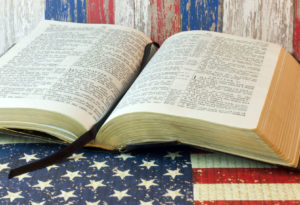Bible-Thumping Democrats Should Be a Curiosity

Running in the Democratic primary for Governor of Florida, candidate Chris King has called himself “something of a curiosity in the Democratic Party” because he is strongly religious. Pro-choice, pro-immigration, and pro-separation of church and state, King says, “I believe in a gospel of love that fights for the right of children to be united with their families—one that believes that it is a sin that we have 2.5 million Floridians without access to healthcare.”
Certainly King’s Christian means arrive at progressive ends that many of us nonreligious dems support, but the truth is that King and his religious language about public policy are not a curiosity on the Left. Democratic, liberal, progressive politicians are using religion and the Bible as a foundation for their policy arguments.
Recently, at a press conference criticizing the nomination of Brett Kavanaugh to the Supreme Court, Senators Cory Booker (D-NJ) and Elizabeth Warren (D-MA) both quoted the Bible, casually using scripture to buttress their political stances. Booker quoted a line from Psalm 23, “Yea, though we [sic] walk through the valley of the shadow of death” and went on to interpret the passage to say that people must take agency and not sit on the sidelines on moral issues such as the nomination of judges.
For her part, Warren argued against Kavanaugh’s past judicial decisions favoring corporations by quoting from Matthew 25:
For I was hungry and you gave me food, I was thirsty and you gave me drink, I was a stranger and you welcomed me, I was naked and you clothed me, I was sick and you visited me, I was in prison and you came to me.
Governor Andrew Cuomo of New York recently connected his condemnation of the death penalty to a decision by the head of the Catholic Church. After Pope Francis declared the death penalty “inadmissible” in all cases, Cuomo tweeted,
The death penalty is morally indefensible and has no place in the twenty-first century. Today, in solidarity with @pontifex (Pope Francis) and in honor of my father, I will be advancing legislation to remove the death penalty from State law once and for all.
Why bring the pope into a discussion of New York state law or the Bible to bear on consideration of a judge for what’s supposed to be a religiously neutral judiciary?
Of course, the impulse of politicians of all stripes—including liberal, Democratic standard-bearers—to quote the Bible or otherwise prove they are authentically religious isn’t new. Throughout the 2016 campaign, including at the Democratic National Convention and in her nomination acceptance speech, Hillary Clinton frequently invoked the Methodist quote: “Do all the good you can, for all the people you can, in all the ways you can, as long as ever you can.” It’s hard to argue with the sentiment, but it did inject Clinton’s personal religion into the political sphere.
More recently, Clinton traded Bible quotes with Attorney General Jeff Sessions. After Sessions quoted the apostle Paul in support of the Trump administration’s policy of separating children from their parents at the border, Clinton didn’t explain to him that the First Amendment precludes the administration from basing government policies on Bible passages. Instead, she simply pointed him to another passage, suggesting that he look to Matthew instead of Paul: “Jesus said suffer the little children unto me. He did not say let the children suffer.”
In a speech in 2006 Barack Obama, then a senator from Illinois, said,
Which passages of scripture should guide our public policy? Should we go with Leviticus, which suggests slavery is ok and that eating shellfish is abomination? How about Deuteronomy, which suggests stoning your child if he strays from the faith? Or should we just stick to the Sermon on the Mount—a passage that is so radical that it’s doubtful that our own Defense Department would survive its application? So before we get carried away, let’s read our Bibles. Folks haven’t been reading their Bibles.
The right answer is the response to Obama’s very first question: none. No passage of any scripture should guide our public policy, and we certainly shouldn’t “read our Bibles” to make government decisions.
All of this is a long way from John F. Kennedy’s statement in 1960:
I am not the Catholic candidate for president. I am the Democratic Party’s candidate for president, who happens also to be a Catholic. I do not speak for my church on public matters, and the church does not speak for me.
Many Republicans, especially the members of Trump’s cabinet and the members of the religious right who surround them, quote scripture as a matter of course. We rightly criticize them when they do. And we shouldn’t let the people we support and agree with on issues and policy get away with it either.
No politician should quote the Bible or any other religious text or authority on policy issues. That’s just not how our government should make decisions. It’s not right when conservative religious politicians do it and it’s no more right when progressives do it.
